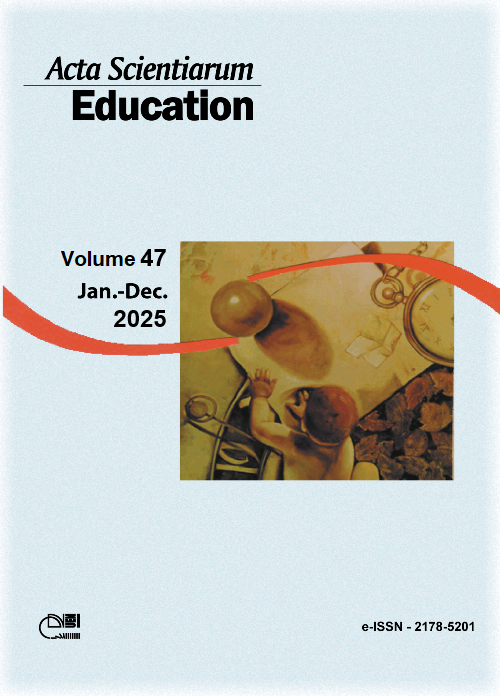Educação ambiental, infância, filosofia e escola: possibilidades de encontros a partir de experiências filosóficas
Resumo
O presente texto busca entender como o exercício do pensamento pode ser provocado no encontro com crianças da Educação Infantil, acerca do mundo em que vivemos e das nossas relações com o planeta. A partir de experiências filosóficas, procurou-se mobilizar a provocação ao pensamento de um grupo de crianças que frequentavam a Educação Infantil, no ano de 2021, na rede pública de um município do extremo sul gaúcho. Apostando na filosofia com crianças, pretendeu-se instigá-las a cuidar do mundo em que vivemos, possibilitando a criação de alguns espaços de respiro na escola, na articulação entre escola, infância, filosofia e Educação Ambiental. O texto problematiza tal experiência no encontro com as fissuras que se buscou criar na escola. Buscamos compreender que sentidos as crianças atribuíam aos lugares os quais transitavam, principalmente o espaço escolar e seu entorno. Será que as crianças se sentiam realmente pertencentes ao espaço escolar? Será que elas se sentiam integrantes do mundo? Enquanto professoras e professores, qual o nosso papel nesse processo? Como as infâncias experienciavam a escola? O que elas pensavam sobre os lugares por onde passavam? O processo metodológico tomou assento no conceito de problematização em Michel Foucault, articulado a hipercrítica de Alfredo Veiga-Neto, fazendo uso dos estudos pós-críticos em Educação, tensionando alguns dos valores de verdade dos discursos em Educação Ambiental, para, quiçá, romper com as fronteiras do pensamento e partir da imprevisibilidade, de experiências irrepetíveis e singulares.
Downloads
Referências
Foucault, M. (1999). Vigiar e punir: nascimento da prisão. Petrópolis, RJ: Vozes.
Foucault, M. (2002). A arqueologia do saber. Rio de Janeiro, RJ: Forence Universitária.
Foucault, M. (2004). Ética, sexualidade e política (Coleção Ditos e Escritos V.). Rio de Janeiro, RJ: Forence Universitária.
Guimarães, L. (2012). Notas sobre o dispositivo da sustentabilidade e a produção de sujeitos “verdes”. In K. Saraiva, & F. Marcello (Ed.). Estudos culturais e educação: desafios atuais (p. 219-232). Canoas, RS: Ulbra.
Henning, P. (2017). Límites y posibilidades de la educación ambiental. Bajo Palabra, 17, 341-358. DOI: https://doi.org/10.15366/bp2017.17.017
Henning, P. (2019). Resistir ao presente: tensionando heranças modernas para pensar a Educação Ambiental. Ciência e Educação, 25(3), 763-781. DOI: https://doi.org/10.1590/1516-731320190030011
Henning, P., & Silva, G. (2018). Rastros da educação ambiental. O dissenso como potência criadora. In P. Henning, A. Mutz, & V. Vieira (Ed.). Educações ambientais possíveis: ecos de Michel Foucault para pensar o presente (p. 151-162). Curitiba, PR: Appris.
Henning, P., & Silva, G. (2021). Um convite ao pensamento: a modo de apresentação. In.: Henning, P., & Silva, G. (org). Educação e filosofia: fissuras no pensamento com Nietzsche, Foucault, Deleuze e outros malditos. Rio Grande, RS: Universidade Federal do Rio Grande.
Janer, J. (2016). O menino que colecionava lugares. Porto Alegre, RS: Mediação.
Kohan, W. (2011). Infância. Entre educação e filosofia. Belo Horizonte, MG: Autêntica.
Kohan, W. (2012). Palavras, passos e nomes para um projeto. In W. Kohan, & B. Olarieta (Ed.). Em Caxias, a filosofia em-caixa?: a escola pública aposta no pensamento. (p. 13-49). Belo Horizonte, MG: Autêntica.
Kohan, W., Masschelein, J., & Simons, M. (2021). Sobre a escola que defendemos. In J. Larrosa (Ed.). Elogio da escola (p. 161-175). Belo Horizonte, MG: Autêntica.
Kohan, W., Olarieta, B., & Wozniak, J. (2012). Repensando, com outras vozes, os sentidos de filosofar. In W. Kohan, & B. Olarieta (Ed.). A escola pública aposta no pensamento. (p. 167-240). Belo Horizonte, MG: Autêntica.
Larrosa, J. (2021). Tremores: escritos sobre experiência. Belo Horizonte, MG: Autêntica.
Lima, P. (2021). Ser e ter: a produção de sentidos – por uma topologia das infâncias e suas relações com a escola. In J. Larrosa (Ed.). Elogio da escola. (p. 299-312). Belo Horizonte, MG: Autêntica.
Massey, D., & Keynes, M. (2004). Filosofia e política da espacialidade: algumas considerações. Geogruphiu, 6(12), 7-23. DOI: https://doi.org/10.22409/GEOgraphia2004.v6i12.a13477
Sampaio, S. M. V. (2019). Como criar uma paisagem em ruínas? Deslocamentos, desconstruções e a insistência de pensar a Educação Ambiental no Antropoceno. Quaestio. Revista de Estudos em Educação, 21(1), 19-38. DOI: https://doi.org/10.22483/2177-5796.2019v21n1p19-38
Silva, T. T. (2007). Documentos de identidade: uma introdução às teorias do currículo. Belo Horizonte, MG: Autêntica.
Simons, M., & Masschelein, J. (2021). Experiências escolares: uma tentativa de encontrar uma voz pedagógica. In J. Larrosa (Ed.). Elogio da escola. (p. 41-63). Belo Horizonte, MG: Autêntica.
Veiga-Neto, A. (2020). A hipercrítica: mais uma volta no parafuso IV. Momento: Diálogos em Educação, 29(1), 16-35. DOI: https://doi.org/10.14295/momento.v29i1.9691
This work is licensed under a Creative Commons Attribution 4.0 International License.
DECLARAÇÃO DE ORIGINALIDADE E DIREITOS AUTORAIS
Declaro que o presente artigo é original, não tendo sido submetido à publicação em qualquer outro periódico nacional ou internacional, quer seja em parte ou em sua totalidade.
Os direitos autorais pertencem exclusivamente aos autores. Os direitos de licenciamento utilizados pelo periódico é a licença Creative Commons Attribution 4.0 (CC BY 4.0): são permitidos o compartilhamento (cópia e distribuição do material em qualquer suporte ou formato) e adaptação (remix, transformação e criação de material a partir do conteúdo assim licenciado para quaisquer fins, inclusive comerciais).
Recomenda-se a leitura desse link para maiores informações sobre o tema: fornecimento de créditos e referências de forma correta, entre outros detalhes cruciais para uso adequado do material licenciado.
















































